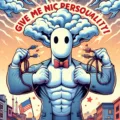Understanding the High Strung Personality
Being a high strung person can feel like constantly walking a tightrope, balancing intense emotions and heightened sensitivity. While this personality trait often gets a bad rap, it’s important to approach it with compassion and understanding. High strung individuals possess unique strengths and face distinct challenges that shape their experiences in life.
A high strung personality is characterized by heightened reactivity to stimuli, a tendency to worry or overthink, and intense emotional responses. These traits can manifest as anxiety, restlessness, and difficulty relaxing. However, they can also fuel creativity, passion, and a drive for excellence.
The Strengths of Being High Strung
Despite the challenges, being high strung comes with several positive attributes:
- Heightened awareness: High strung individuals are often highly perceptive and attuned to their environment.
- Passion and intensity: They tend to approach life with enthusiasm and deep commitment.
- Creativity: The intense emotional experiences of high strung people can fuel artistic expression and innovative thinking.
- Empathy: Their sensitivity often translates to a strong ability to understand and connect with others’ emotions.
Navigating the Challenges of a High Strung Personality
While being high strung can be an asset, it’s essential to develop strategies for managing the more challenging aspects:
- Practice mindfulness: Mindfulness techniques can help ground you in the present moment and reduce anxiety.
- Establish routines: Creating structure in your daily life can provide a sense of stability and control.
- Prioritize self-care: Regular exercise, adequate sleep, and a balanced diet are crucial for managing stress.
- Seek support: Don’t hesitate to lean on friends, family, or a mental health professional when needed.
Embracing Your Sensitive Nature
Learning to embrace your high strung nature rather than fighting against it can lead to greater self-acceptance and well-being. Recognize that your sensitivity is a part of who you are and can be a source of strength when channeled effectively.
Consider reframing your perspective on being high strung. Instead of viewing it as a flaw, see it as a unique aspect of your personality that contributes to your creativity, passion, and empathy. By accepting and working with your natural tendencies, you can harness your energy in positive ways.
Building Resilience as a High Strung Person
Developing resilience is key to thriving as a high strung individual. Here are some strategies to build emotional strength:
- Practice self-compassion: Be kind to yourself, especially during challenging times.
- Develop a growth mindset: View challenges as opportunities for growth rather than insurmountable obstacles.
- Cultivate a support network: Surround yourself with understanding and supportive people.
- Learn stress management techniques: Explore various methods like deep breathing, progressive muscle relaxation, or yoga.
Remember, building resilience is a journey, not a destination. Be patient with yourself as you develop these skills over time.
Nurturing Relationships as a High Strung Person
Navigating relationships can be both rewarding and challenging for high strung individuals. Here are some tips for fostering healthy connections:
- Communicate openly: Share your needs and feelings with loved ones, helping them understand your perspective.
- Set boundaries: Learn to say no and protect your energy when necessary.
- Practice active listening: Focus on truly understanding others, not just waiting for your turn to speak.
- Show appreciation: Express gratitude for the support and understanding of those around you.
By fostering open communication and mutual understanding, you can build strong, supportive relationships that enhance your life.
FAQ: Understanding and Embracing a High Strung Personality
Q1: Is being high strung the same as having an anxiety disorder?
A1: While being high strung and having an anxiety disorder can share some similarities, they are not the same thing. Being high strung is a personality trait characterized by heightened sensitivity and reactivity, while an anxiety disorder is a diagnosable mental health condition. However, high strung individuals may be more prone to developing anxiety disorders. If you’re concerned about your anxiety levels, it’s always best to consult with a mental health professional.
Q2: Can a high strung personality be changed?
A2: While core personality traits are generally stable, it’s possible to learn strategies to manage the challenges associated with being high strung. Through self-awareness, mindfulness practices, and developing coping mechanisms, you can learn to channel your high strung nature in more positive ways and reduce its negative impacts on your life.
Q3: How can I support a loved one who is high strung?
A3: Supporting a high strung loved one involves patience, understanding, and open communication. Listen without judgment, validate their feelings, and offer support in ways that work for them. Encourage self-care practices and be understanding of their need for downtime or space when feeling overwhelmed. Your consistent support can make a significant difference in their well-being.
Q4: Are there any benefits to being high strung?
A4: Absolutely! High strung individuals often possess qualities such as heightened creativity, strong empathy, passionate dedication to their interests, and acute attention to detail. These traits can be significant assets in both personal and professional life when channeled effectively.
Q5: How can I explain my high strung nature to others who don’t understand?
A5: When explaining your high strung nature to others, focus on both the challenges and strengths it brings. You might say something like, “I experience emotions and stimuli more intensely than some people. This can make me sensitive to stress, but it also allows me to be very empathetic and passionate about things I care about.” Educating others about your experiences can foster understanding and support.









